 What really causes infertility? Infertility affects 7.3 million people in the U.S. The disease also affects 1 in 8 couples in the U.S., and having difficulty conceiving can be an emotional and confusing time for partners.
What really causes infertility? Infertility affects 7.3 million people in the U.S. The disease also affects 1 in 8 couples in the U.S., and having difficulty conceiving can be an emotional and confusing time for partners.
There are several factors that can cause fertility issues, such as age, endometriosis, irregular periods, issues with a man’s sperm, etc. so it’s important that people understand their bodies to take charge of their fertility health. Unfortunately, for most couples, there are no warning signs for infertility until they begin trying to get pregnant. Here are some common myths about infertility debunked courtesy of First Response spokesperson Dr. Mary Jane Minkin, clinical professor of Obstetrics and Gynecology at Yale University School of Medicine.
MYTH #1: Fertility problems only occur after age 35.
FACT: According to Dr. Minkin, while age is definitely a factor in a woman’s chances of getting pregnant, it’s not the only one. Endometriosis, irregular periods and Polycystic Ovary Syndrome may also limit the chances of becoming pregnant. Fertility is complex. Women under 35 years of age who have been trying to get pregnant for over 12 months, or women 35 years of age or older who have been trying to get pregnant for 6 months should consult a physician.
MYTH #2: Having sex as much as possible will increase chances of conception.
FACT: Chances of conception are highest during the time of the woman’s ovulation. To ensure you know the two days of your cycle when you’re most fertile and more likely to conceive, track your cycle with a product such as the FIRST RESPONSE™ Digital Ovulation Test. This test remembers your body’s hormone level to detect your personal LH surge and the 24-36 hours when you are most likely to conceive.
MYTH #3: Getting pregnant will happen right away once you stop taking the pill.
FACT: Your body needs time to adjust to new hormone levels and return to your natural cycle. Dr. Minkin informs that you can get pregnant quickly; however your body will most likely need a period of readjustment.
MYTH #4: Worrying decreases changes of conception.
FACT: There’s no research of clinical evidence to support that “worrying” hinders conception. Extreme stress can affect your ability to ovulate in very rare cases. “Worrying about it,” on the other hand can be useful if it moves you to action in the form of determining your ovulation and then timing intercourse to coincide with your most fertile time.
If you are thinking about starting a family, try an at-home test like the FIRST RESPONSETM Fertility Test For Women , which gauges a women’s ability to get pregnant by assessing her ovarian reserve. It is a great first step for any women to take before trying to conceive, and can be done in the privacy of her own home – no medical appointment required. Visit FirstResponse.com for more information about family planning.








